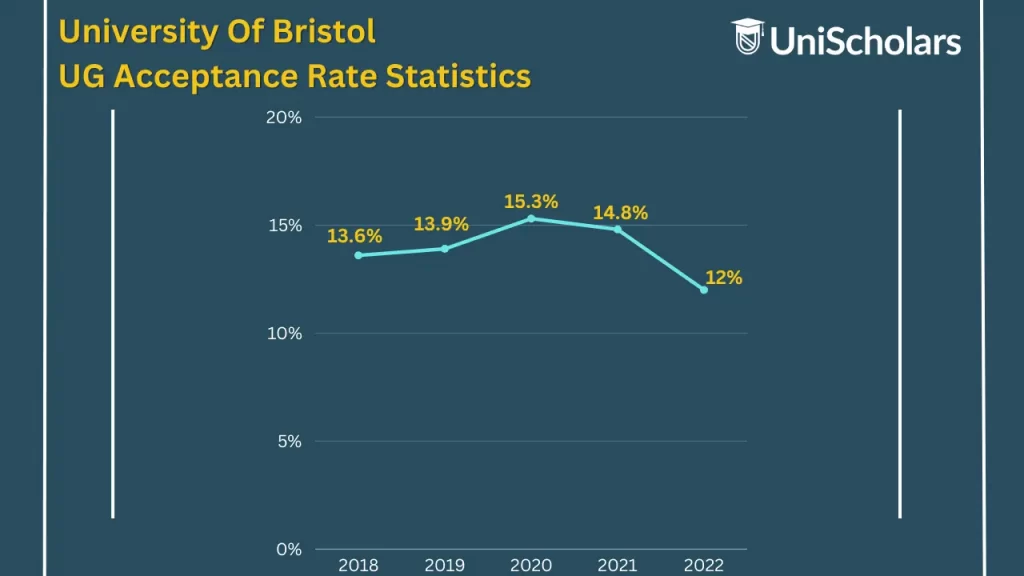Table of Contents
ToggleThis red brick beauty traces its roots back to the 16th century. The University of Bristol was given university status and came into existence in 1876. A university which is as old as time and makes study in the UK so attractive also holds high level of reputation in the English-speaking world. Getting here is no joke, as it requires students to be the best versions of themselves.
The University of Bristol acceptance rate is a number which is technically the first mountain you will have to climb in getting here. So don’t stop here and read on to know more not just about the admission rate but much more in our blog on the University of Bristol acceptance rate!
Key Takeaways
Acceptance Rate: Bristol’s acceptance rate is approximately 68% which makes it relatively less competitive compared to other institutions in the UK.
Other Acceptance Rates: Various undergraduate courses exhibit distinct acceptance rates, with Dentistry and Anatomy having the lowest rates, providing insights for prospective applicants.
Factors Influencing: Application volume, academic requirements, course capacity, applicant strength, marketing efforts, university rankings and institutional reputation are what affect this number.
Admission Requirements: Applicants can apply through the UCAS portal for undergraduate courses and the University Portal for postgraduate programs, with specific application fees and accepted English language tests.
Other Information: The University of Bristol’s acceptance rate and application deadlines vary for undergraduate and postgraduate programs, with the UCAS deadline for undergraduate applications set at January 31, 2024.
Your Bristol University Story Starts Here!
Get the insider edge for your application from our experts.
What is the University of Bristol Acceptance Rate?
University of Bristol acceptance rate stands at approximately 68% in 2024. This clearly indicates that out of every 100 applicants, the university admits around 67-68 students. In short, the University of Bristol’s acceptance rate suggests that its admission process is relatively less competitive when compared to other universities in Bristol and the UK at large.
Trends Observed In The Acceptance Rate Of Bristol University
We have referred to a large set of data from 2018 to 2022 to offer clear and helpful viewpoints that can help many students and those looking to become Bristol students. It’s important for everyone to start by understanding the University of Bristol acceptance rate and the factors that influence your chances of admission. This knowledge can help prospective students learn how to apply to university with a strong application.

University Of Bristol Undergraduate Acceptance Rate
Dentistry and Anatomy courses tend to have the lowest acceptance rates at Bristol. The undergraduate programmes at Bristol seem to have different acceptance rates as well. If you’re planning to apply at this level, make sure you look into this table below:
| Course | Acceptance Rate |
| Dentistry | 3.87% |
| Anatomy | 5.71% |
| Civil, Aerospace and Mechanical Engineering | 6.61% |
| Psychological Science | 7.14% |
| Veterinary | 7.71% |
| Education | 8.33% |
| Management | 8.53% |
| Sociology, Politics and International Studies | 9.13% |
| Policy Studies | 9.25% |
| Computer Science, Electrical and Electronic Engineering, and Engineering Mathematics (SCEEM) | 10.08% |
| Medicine | 10.22% |
| Biochemistry | 10.69% |
| Law | 11.65% |
| Earth Sciences | 12.20% |
| Cellular and Molecular Medicine | 12.50% |
| Physiology, Pharmacology and Neuroscience | 12.50% |
| Accounting and Finance | 12.57% |
| Faculty of Arts | 13.98% |
| Geographical Sciences | 14.04% |
| Arts | 14.45% |
| Biological Sciences | 14.55% |
| Modern Languages | 16.11% |
| Economics | 16.13% |
| Humanities | 18.18% |
| Physics | 19.55% |
| Centre For Innovation | 20.24% |
| Mathematics | 21.67% |
| Chemistry | 21.76% |
University Of Bristol Postgraduate Acceptance Rate
More than 7000 students apply for postgraduate courses at the University of Bristol. The acceptance rates indicate moderate competitiveness. You can read more about this below:
| Course | Acceptance Rate |
| Management | 7.27% |
| Accounting and Finance | 8.57% |
| Mathematics | 8.77% |
| Veterinary | 9.68% |
| Geographical Sciences | 10.00% |
| Biological Sciences | 10.98% |
| Medicine | 13.18% |
| Earth Sciences | 13.33% |
| Law | 13.51% |
| Biochemistry | 14.29% |
| Physics | 17.05% |
| Civil, Aerospace and Mechanical Engineering | 17.19% |
| Dentistry | 18.18% |
| Policy Studies | 18.52% |
| Physiology, Pharmacology and Neuroscience | 18.75% |
| Humanities | 19.05% |
| Cellular and Molecular Medicine | 19.05% |
| Psychological Science | 19.23% |
| Computer Science, Electrical and Electronic Engineering, and Engineering Mathematics | 20.71% |
| Education | 21.74% |
| Arts | 21.88% |
| Chemistry | 22.39% |
| Sociology, Politics and International Studies | 22.73% |
| Modern Languages | 25.00% |
Factors Influencing The University Of Bristol Acceptance Rate
Acceptance rates at Bristol can be as unpredictable as the British weather, fluctuating up and down from year to year. But fear not, for behind this seeming randomness lies a complex interplay of factors. Let’s dive into the factors that influence your chances of landing that coveted acceptance letter:
1. Application Volume:
When the number of applicants significantly increases without a corresponding increase in available spots, the University of Bristol acceptance rate for Indian students too naturally declines.
2. Academic Requirements:
If Bristol raises its academic entry standards, fewer applicants will meet the criteria, leading to a lower acceptance rate.
3. Course Capacity:
Conversely, expanding the number of places available in certain courses can increase the acceptance rate for those programmes.
4. Applicant Strength:
A pool of exceptionally strong applicants with high academic achievements and impressive extracurriculars can push the acceptance rate down due to increased competition.
5. Marketing and Recruitment:
Effective marketing campaigns and open days can attract a larger applicant pool, potentially raising the acceptance rate.
6. University Rankings:
Climbing the ladder of university rankings can boost Bristol’s prestige, attracting more applicants and impacting the acceptance rate.
7. Institutional Reputation:
A growing academic reputation, through research achievements, notable alumni, or positive word-of-mouth, can also lead to a more competitive applicant pool and a lower acceptance rate.
University Of Bristol Admission Highlights
There are over 600 undergraduate and postgraduate courses available at Bristol to apply. These courses have more or less the same acceptance criteria. There are scholarships offered by the University of Bristol if you excel the below requirements.
| Particulars | Details |
| Application Portal | UG: UCAS PG: University Portal |
| Acceptance Rate | 68% |
| Bristol Application Fee | UG: £60 PG: £60 MBA: £60 |
| English Language Tests Accepted | IELTS / TOEFL / PTE, etc. |
| Standardised Test Scores (PG) | GMAT / GRE |
| International Application Deadlines | UG UCAS Deadline: Jan 31 2024 PG Varies as per the programme |
FAQs
1. What is the University of Bristol acceptance rate?
The acceptance rate stands at approximately 68%.
2. What is the minimum GPA for University of Bristol?
Students will need a minimum of 3.2 on a scale of 4.0 to get into Bristol University.
3. Does the University of Bristol have a higher acceptance rate for international students?
It remains the same for both international and domestic students which is 68%.
4. How does the University of Bristol’s acceptance rate compare to other UK universities?
It is quite high as compared to other Russell Group universities in the UK such as Cambridge and Oxford.
5. What factors affect the acceptance rate at University of Bristol?
Admission standards and requirements, competition among other Russell Group universities, application procedure and others are factors which influence the admission rate at Bristol.


















1 thought on “Top PGDM Courses In Canada: Universities & Eligibility”
I have done Bachelor’s in Culinary Arts from India and completed my graduation in the year 2022 .I am 22 years old. After graduation, I have done 1 year paid internship from USA .Now, I would like to take occupational experience and learn culinary skills and also do masters in Culinary arts.How can I find the college n best course / country where I can persue studying further